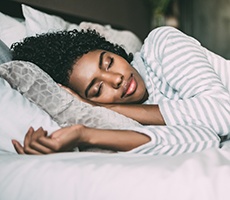Tips for Better Sleep
 Sleep is absolutely critical for great self-care. Without it, we’ll lack the ability to fully enjoy and be present for our lives, affecting everything from work to personal relationships.
Sleep is absolutely critical for great self-care. Without it, we’ll lack the ability to fully enjoy and be present for our lives, affecting everything from work to personal relationships.
But actually achieving better sleep can seem like a vague goal. In the real world of responsibilities, a never-ending to-do list and stress, how is it accomplished? These practical tips are small steps that lead to BIG improvements in sleep quality.
- Keep bedtime consistent - same time to bed 7 nights a week. This may very well be THE most important thing you can do to improve your sleep.
- Set your thermostat at a max of 68. This is more important as you age or if you have insomnia.
- As soon as you get up in the morning, go outside and get some fresh air for 10 minutes.
- No caffeine after 12 noon.
- Take breaks during the day. This lowers stress levels and allows your brain to slow down at the end of the day.
- Get at least an hour of sunlight every day.
- Be engaged. Social activities, family, and work can keep your activity level up and prepare your body for a good night’s sleep.
- Exercise
- Don’t take naps.
- Furniture and décor should be calming. Blues and greens have been shown to be more soothing than reds.
- Reduce clutter. At least in your bedroom.
- Cut out late night meals. If your body is busy digesting it is not resting.
- Cut alcohol at least 4 hours before bedtime.
- Cut smoking and other tobacco use. Even though it may relax you during the day it will take you longer to get to sleep and can have a rebound effect in the middle of the night.
- Raise the humidity in your room to help keep mucosal tissues from drying out.
- Consider an air cleaner. Especially if you have dust or mite allergies.
- If you live in a noisy area consider getting a white noise machine.
- Cut back on all screen time. Studies show these electronics definitely harm our sleep cycles.
- Clear out the bedroom. No TVs, no work, no activities that alert you.
- Do not read from backlit devices in the bedroom. Sorry iPad.
- Create a bedtime routine.
- Dim the lights one hour before bedtime. It sends your mind and body the signal that it is time to start winding down.
- Try a warm glass of milk or chamomile tea.
- Limit your use of sleeping aids or sleeping pills.
- Try tryptophan. Some experts believe a tryptophan deficiency can cause problems with sleep. Made from tryptophan (an amino acid), 5-HTP (5-Hydroxytryptophan) helps the body make serotonin. Low levels of serotonin are a known factor in sleepless nights.
- Take a warm bath prior to a cold bed. As the water evaporates, it cools the skin in preparation for sleep.
- Wear socks to bed. Cold feet = a poor night's sleep.
- Leave your phone to charge in the living room.
- Try using an orange light in reading lamp, as it does not suppress melatonin secretion like white light.
- Meditate before bed. Try visualizing a dream you'd like to have.
- Sleep in total blackness. If that is not possible, wear an eye mask.
- Comfortable mattress, blankets and pillow will help. A 2-year old pillow needs to be replaced, and should be hypoallergenic. However, there are no studies at this time showing one mattress type is better than another for sleep. However, there is research to show that you will sleep better on clean sheets.
- Change your air filters every 3 months.
- Try the right scent. Some scents are shown to be calming. Try a lavender or chamomile scent to help relax.
- If you have gastric reflux or obstructive sleep apnea try tilting the head of your bed up to prevent rostral fluid shift.
- Don’t torture yourself. If you are doing everything right and still laying in bed having trouble falling asleep then get up and go do something relaxing. Don’t go watch TV, play video games, read from your backlit screen, etc. Those all signal your body that it is time to wake up. Go read a book (remember paper), or do something boring.
- Set a kinder, gentler alarm. If you have the loud, obnoxious, honking alarm get rid of it. Wake to some refreshing music or soothing sounds at an appropriate volume.
Like these tips? Share this page on social media or with a friend!
